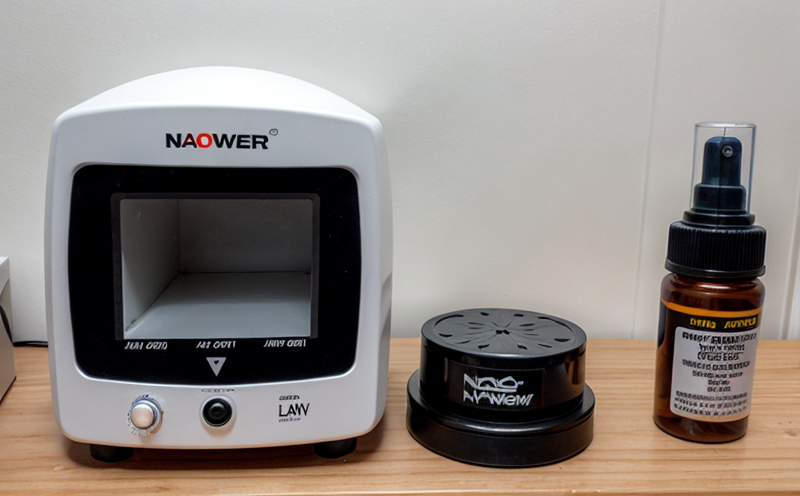DIN 66143 Density Testing of Fine Particle Powders
The DIN standard DIN 66143 provides a comprehensive approach to determining the density of fine particle powders, which is critical for ensuring product quality and safety in numerous industrial sectors. This method focuses on measuring both bulk density and tapped density (also known as angle of repose). The bulk density measures the mass per unit volume when the powder is loose, while the tapped density reflects how tightly packed a material can be after it has been tamped down. Both metrics are essential for optimizing product formulation, ensuring accurate dosing in production processes, and preventing issues such as caking or bridging.
The testing procedure outlined in DIN 66143 involves several key steps to ensure accuracy and consistency:
- Sample preparation: The sample should be representative of the material being tested. This often requires sieving, homogenization, and drying if necessary.
- Bulk density measurement: A predetermined volume of powder is placed into a graduated cylinder, and its mass is measured. Care must be taken to ensure that the powder settles naturally without any external pressure or vibration.
- Tapped density measurement: The same volume of powder is tapped down using a specific device until it reaches a stable state. The mass after tapping is compared to the initial bulk density measurement.
- Repeatability and reproducibility: Multiple measurements are taken to ensure that results are consistent across trials. This step is crucial for compliance with industry standards and regulatory requirements.
The accuracy of these measurements can significantly impact product performance, especially in industries such as pharmaceuticals, electronics, and construction materials. For instance, in the pharmaceutical sector, incorrect density measurements could lead to dosing errors or poor drug stability. In electronics manufacturing, variations in tapped density might affect the reliability of components.
DIN 66143 is widely recognized for its robustness and applicability across various industries. Compliance with this standard not only ensures product quality but also facilitates international trade by aligning with global norms. Manufacturers who adhere to DIN 66143 can be assured that their products meet stringent quality standards, enhancing customer trust and satisfaction.
Our laboratory uses state-of-the-art equipment and follows strict protocols to perform DIN 66143 density tests accurately and efficiently. Our experienced technicians are trained in the latest techniques and methodologies, ensuring reliable results every time. Whether you need assistance with bulk or tapped density testing, our team can help you meet your specific requirements.
Industry Applications
DIN 66143 density testing is applicable across a wide range of industries where the properties of fine particle powders play a critical role in product performance and safety. Some key sectors include:
- Pharmaceuticals: Ensuring accurate dosing and preventing issues like caking or bridging.
- Fine chemicals: Optimizing reaction conditions and ensuring consistent product quality.
- Construction materials: Guaranteeing proper mixing ratios for concrete, mortar, and other building materials.
- Electronics manufacturing: Ensuring reliable component performance by controlling powder density.
- Aerospace: Maintaining high standards of quality control to prevent failures in critical components.
- Petrochemicals: Ensuring safe and efficient handling of powders during production processes.
In each of these industries, the ability to accurately measure bulk and tapped density is crucial for maintaining product integrity and ensuring compliance with relevant regulations. Our laboratory provides comprehensive testing services tailored to meet the unique needs of each sector, helping businesses stay competitive in today's global market.
Quality and Reliability Assurance
DIN 66143 density testing is a vital component of quality assurance programs designed to maintain consistent product performance and reliability. By accurately measuring both bulk and tapped density, manufacturers can:
- Ensure consistency: Consistent density measurements across batches or production runs help prevent variability in product quality.
- Identify issues early: Abnormal density readings may indicate problems with the manufacturing process or raw material quality.
- Optimize processes: Understanding how different factors affect density can lead to process improvements and cost savings.
- Achieve regulatory compliance: Adherence to international standards like DIN ensures that products meet safety and performance requirements set by regulatory bodies.
- Enhance customer satisfaction: Consistently high-quality products build trust with customers, leading to repeat business and positive reviews.
In addition to these benefits, our laboratory offers detailed reporting and analysis of test results. This information can be used to identify areas for improvement or to document compliance with specific standards. Our team works closely with clients to ensure that all testing needs are met efficiently and effectively.
Use Cases and Application Examples
DIN 66143 density testing finds application in various scenarios where accurate measurements of fine particle powders are essential:
- New product development: During research and development, accurate density measurements help refine formulations and optimize production processes.
- Supplier audits: Ensuring that raw materials meet specified density criteria helps maintain consistent quality across supply chains.
- In-process monitoring: Real-time density measurements during manufacturing can alert operators to potential issues before they become significant problems.
- Quality control: Regular testing ensures that finished products consistently meet established standards and specifications.
- Customer satisfaction: Providing accurate data on product performance enhances customer confidence in the reliability of the product.
We have successfully implemented DIN 66143 density tests for clients across multiple industries, including pharmaceuticals, electronics, and construction materials. Our team works closely with each client to understand their unique requirements and develop tailored testing solutions that meet those needs.





